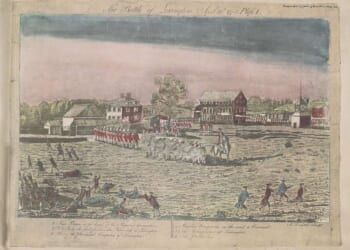There are specific things one can take issue with when it comes to Donald Trump’s efforts to bring an end to the war in Ukraine and lower tensions with Russia—his public browbeating of Ukraine’s President Volodymyr Zelensky, for instance, or his decision to preemptively lift sanctions on Russia without extracting any concessions in return. But for months, the consensus among the liberal press and the Atlanticist establishment has been that the entire project on its own is inherently suspect, an act of treachery, surrender, and, of course, 1938-style appeasement.
“Forcing Ukraine to cede land will only increase Putin’s imperial appetite,” warned the Atlantic Council shortly after Trump’s win. Labelling the peace plan he recently put forward “one-sided” by pressuring Ukraine to concede territory, the New York Times charged that the president “plays into Putin’s hands,” echoing the German defense minister’s words that any territorial concessions are “akin to a capitulation” and widespread accusations from European officials and others of appeasement. Zelensky himself has somewhat conspiratorially claimed that “Russia has managed to influence some people on the White House team through information,” a claim echoed in mainstream reporting.
But arguably the line was set by Sen. Elissa Slotkin (D-MI) in her response to the State of the Union address in March, in which she accused Trump of “cozying up to dictators like Vladimir Putin” and said that “as a Cold War kid, I’m thankful it was [former president Ronald] Reagan and not Trump in office in the 1980s. Trump would have lost us the Cold War.”
Yet ironically, Reagan was attacked in almost the exact same terms that Slotkin and others use for Trump, and for doing almost the exact same thing: trying to negotiate with the Soviet Union and to improve relations between the two nuclear superpowers while the Soviets were in the middle of a similarly brutal invasion of Afghanistan. But, for Reagan, that criticism came almost entirely from Cold War hawks on the hard right.
“The Reagan administration is so eager for ‘improved’ relations (‘improvement’ means less friction, which means more US passivity as the Soviet Union behaves as it always does) that when the president spoke to the United Nations last year, his reference to Afghanistan was so brief and limp that William Buckley said the president ‘made it seem as though the poor Afghans were suffering from chicken pox,’” complained the conservative columnist George Will in early 1985, as then-Secretary of State George Shultz embarked on arms-control talks with his Soviet counterpart. In the column, Will outlined in lurid detail a list of Soviet war crimes that, he implied, made talks unacceptable, and called the idea that the Soviet state desired agreements that would allow for peaceful coexistence a “radically false premise,” insisting that “the Soviet regime regards jawing as a facet of warring.”
Hawkish pressure on Reagan didn’t just come from newspaper columns. A group of conservative Republicans that included Jesse Helms sent Reagan three separate letters urging him to take a hardline stance on Soviet violations of previous arms deals and refuse to engage in talks until those were rectified. At the time, Reagan’s efforts were being widely applauded by Congressional leaders of both parties.
As U.S.–Soviet rapprochement advanced, this kind of rhetoric intensified, as when Reagan and the Soviet President Mikhail Gorbachev held a historic summit in Iceland in October 1986. “The record of all the summit conferences gives one no encouragement to think that they produce any lasting improvement in US-Soviet relations,” griped the National Review editor and former Richard Nixon speechwriter Jeffrey Hart, who cast the entire exercise as a Machiavellian chess move by Gorbachev. “We are no friendlier today than we were in 1945.”
“There will be much dissecting of how well, or how badly, the cause of peace was served by the summit in Iceland,” wrote the Christian Science Monitor columnist and former Reagan official John C. Hughes, who, like Hart and many peace-averse voices 40 years later today, brought up “appeasement” and Winston Churchill. The former British prime minister “would surely have counseled vigilance in dealing with the Soviets, and the only ghost he would have feared would have been that of Neville Chamberlain’s tragic appeasement policy,” he wrote.
But this was nothing compared to the firestorm that erupted on the right when Reagan and Gorbachev finally signed the Intermediate-Range Nuclear Forces (INF) treaty in December 1987. In response, the conservative activists Richard Viguerie and Howard Phillips formed the “Anti-Appeasement Alliance,” warned that Reagan had “resurrected the disastrous policy of detente,” and was marching “headlong into another Munich.”
Phillips was particularly incensed. When Reagan publicly said that his right-wing critics seemed to have deep down “accepted that war is inevitable,” and privately told reporters he didn’t think the Soviet Union under Gorbachev was seeking world domination, Phillips called him a “useful idiot for Soviet propaganda”—while charging that ratification of the INF treaty would mean “a major battle of World War III will have been lost by default,” proving Reagan’s point.
After cautioning during the Iceland summit that an INF treaty might “leave the remaining balance tipped further in favor of the Soviets” and show they “could manipulate the politics of the Western democracies,” the Wall Street Journal questioned, upon the agreement’s signing, Gorbachev’s sincerity and warned that the USSR had “achieved an important political objective at almost no cost to their own offensive capability” of persuading the world of their good will. The conservative weekly Human Events fretted that Reagan would “give away the store.” Less famous voices got in on the act too. One unsigned editorial at the Danville Register and Bee brought up—what else?—Chamberlain and Munich, warning that Hitler invaded Poland 11 months after “peace in our time” was declared and concluding, “Treaties mean nothing to totalitarian leaders.”
Subscribe Today
Get daily emails in your inbox
Of course, with hindsight, we can say with uncertainty that all of this nay-saying was wrong. Gorbachev’s friendship with Reagan wasn’t a cynical ruse, but genuine and pivotal to the end of the Cold War; the late Soviet leader wasn’t using talks and arms control as an alternative form of war, but became widely admired in the West as a peacemaker and elder statesman; the INF treaty wasn’t a cunning trap, but came to be viewed as a cornerstone in arms control; and none of this opened the door to further war and Soviet expansionism, as the constant Munich references held, but rather led to thawing U.S.–Soviet relations and, ultimately, to a peace that was globally celebrated.
Democrats during Reagan’s years did criticize the president over talks—but in stark contrast to today, they attacked him for not engaging in diplomacy with the Soviet Union, which Reagan didn’t do in any meaningful way for his entire first term. When Reagan did announce a meeting with the Soviet foreign minister in September 1984, Democratic opponent Walter Mondale’s objection wasn’t that he was doing it, but that he had waited until five weeks before his re-election to do it, and that he wasn’t meeting with his Soviet counterpart directly, saying, “If they would come out with a significant arms control agreement, I’d be very thrilled.” Other top Democrats made similar points at the time.
What’s remarkable is not just that critics of U.S.–Russian rapprochement have not changed their arguments an iota, still making references to Churchill, Chamberlain and Munich that were already years out of date nearly 40 years ago when what was called the “Right of Reagan crowd” made these attacks. It’s that the voices that have wholesale lifted these talking points from the hard right of the 1980s are now overwhelmingly on the Democratic and liberal side of the ledger. In a rational political climate, it should be a cause for some serious self-reflection among those cheering against peace.







